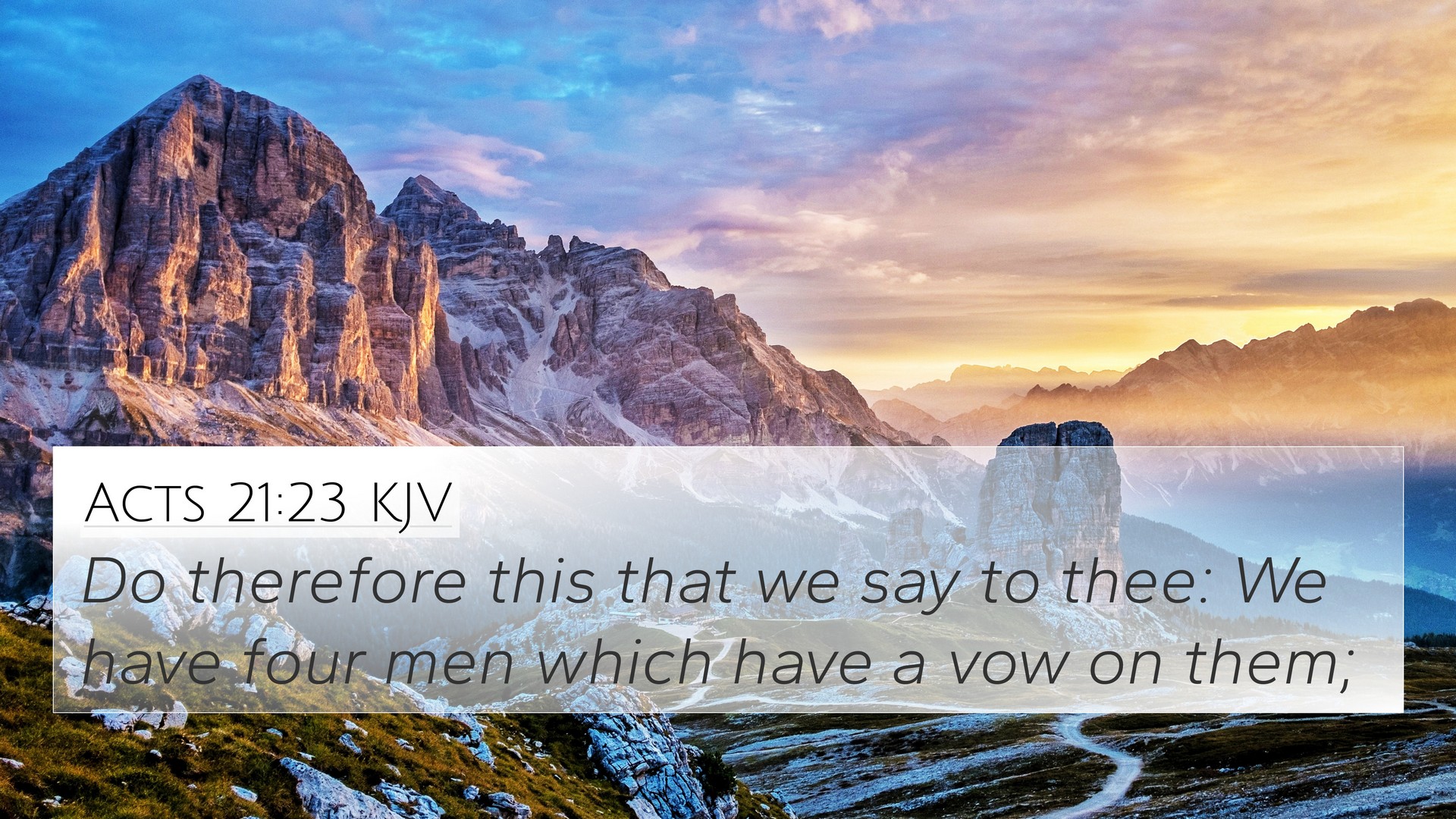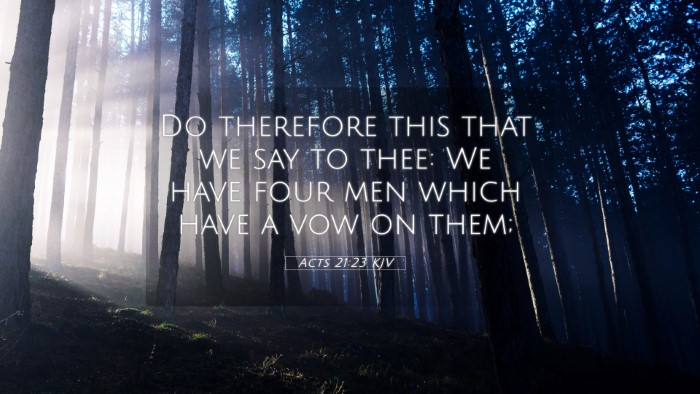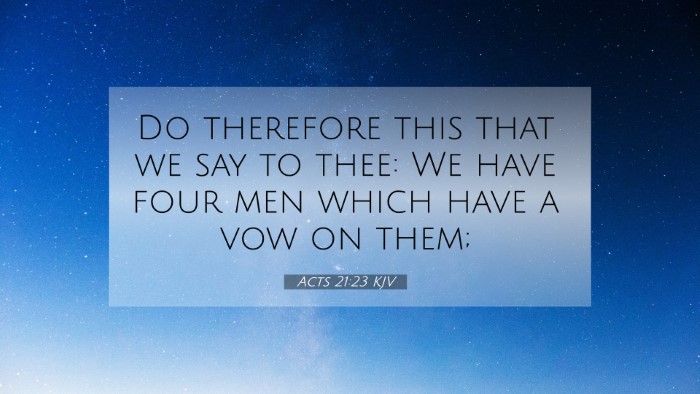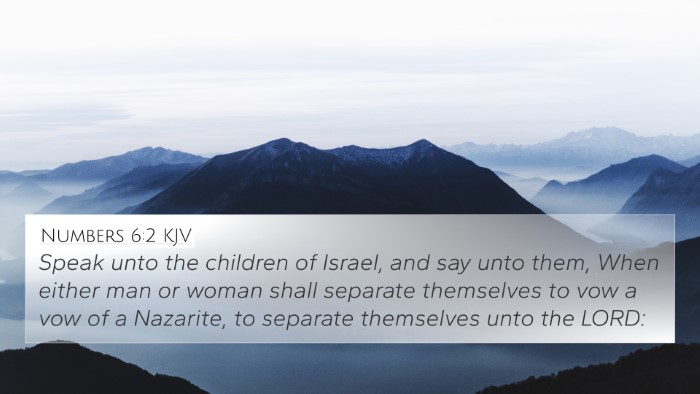Understanding Acts 21:23
Acts 21:23 states: "Do therefore what we tell you: We have four men who are under a vow." This verse is part of a larger narrative concerning the Apostle Paul and his actions in Jerusalem. To comprehend its meaning fully, various public domain commentaries provide insights that highlight both the immediate context and broader biblical connections.
Contextual Overview
This verse occurs during a critical moment in Paul's ministry, reflecting the tension between his mission to the Gentiles and the Jewish believers’ adherence to the Law. Here, James, the leader of the Jerusalem church, advises Paul on how to mitigate potential backlash from Jewish Christians who were concerned about his teachings.
Commentary Insights
Matthew Henry's Commentary
Matthew Henry highlights that Paul, despite being the apostle to the Gentiles, shows respect to the Jewish customs and rituals. This is a practical approach to maintaining unity within the church. His willingness to undergo the purification rites illustrates his sensitivity to Jewish believers and his desire to avoid unnecessary offense.
Albert Barnes' Notes
Albert Barnes emphasizes the significance of Paul's actions as a demonstration of his commitment to the Jewish faith, despite his apostolic mission. He notes that this instance underscores the need for believers to find common ground, making accommodations where possible to foster unity among diverse groups.
Adam Clarke's Commentary
Adam Clarke points out that the vow mentioned likely refers to a Nazirite vow, which involved certain commitments and rituals. This act serves as a bridge to connect Paul's mission with the Jewish traditions, indicating a broader strategy of evangelism that incorporates respect for Jewish customs.
Bible Verse Cross-References
- Romans 14:13 - "Therefore let us not pass judgment on one another any longer, but rather decide never to put a stumbling block or hindrance in the way of a brother." This verse reflects the principle of accommodating each other’s convictions.
- 1 Corinthians 9:20 - "To the Jews I became as a Jew, in order to win Jews." This passage parallels Paul’s actions in Acts 21:23, showing his strategic approach in different cultural contexts.
- Acts 18:18 - "After this, Paul stayed many days longer... and he had his hair cut for he was under a vow." This reference directly links to the practice Paul is now participating in.
- Galatians 2:14 - "But when I saw that their conduct was not in step with the truth of the gospel, I said to Cephas before them all..." This indicates the challenges Paul faced concerning the Law and the gospel's truth.
- Acts 15:1 - "But some men came down from Judea and were teaching the brothers..." which underlines the conflict in early Christianity between Gentile inclusion and Jewish laws.
- Jeremiah 34:18 - "And the men who transgressed my covenant and did not keep the terms of the covenant that they made before me..." which speaks to the importance of covenant fidelity seen in Paul's vow.
- Luke 2:27 - "And he came in the Spirit into the temple; and when the parents brought in the child Jesus..." This relates to the practices of Jews, including vows and rituals, which is integral to understanding the culture Paul navigates.
Thematic Bible Verse Connections
This verse opens up discussions on the themes of unity, adaptability, and cultural sensitivity in the early church. Crucially, it highlights how Paul balanced his mission with respect for Jewish customs, suggesting that understanding and honoring diverse practices can be vital in maintaining community unity.
Cross-Referencing Biblical Texts
Utilizing tools for Bible cross-referencing allows believers to explore connections between diverse passages. These tools include:
- Bible concordances
- Bible cross-reference guides
- Bible reference resources
By leveraging these resources, one can delve deeper into the text and uncover how passages relate, revealing underlying themes and doctrines that inform Christian faith and practice.
How to Use Bible Cross-References
To utilize cross-references effectively, consider these study methods:
- Identify keywords or themes within verses.
- Examine how the same concepts are presented in different contexts.
- Draw parallels between the Old and New Testaments to uncover continuity in God’s revelation.
Conclusion
Acts 21:23 offers profound insights into early Christian dynamics, the intersection of Jewish law and Christian liberty, and the wisdom of navigating complex relational landscapes. Understanding the verse through the lenses of respected commentaries and cross-referencing with related scriptures enriches one's grasp of biblical teachings and fosters a deeper faith.




